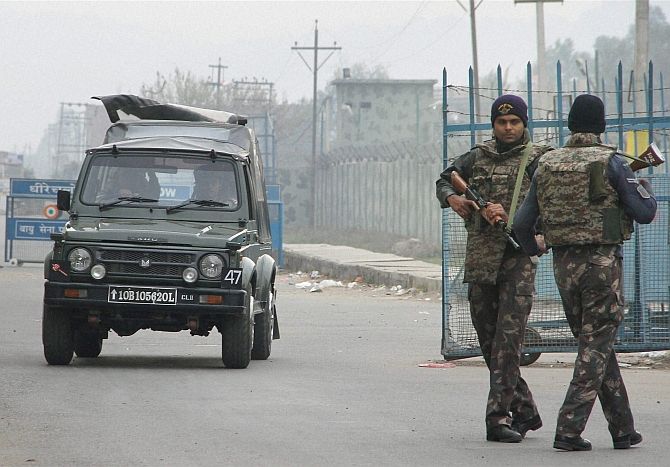'In this Spy versus Soldier game,' says Rajeev Sharma, 'the two sides will size up each other like never before.'

International diplomacy has always been a game of chess played between practising diplomats of two sides in bilateral context. It must be quite a rarity to see two non diplomats playing this game of 64 squares -- one a career spy and another a soldier.
India and Pakistan's National Security Advisors Ajit Doval and General Nasir Janjua respectively are currently engaged in this intricate game.
Pakistan's unprecedented move proposing to send its Special Investigation Team to probe the Pathankot terror attack and India welcoming it -- which means that for the first time ever India and Pakistan will jointly probe a terror incident -- is nothing but a game of chess.
In this Spy versus Soldier game, the two sides will size up each other like never before. Each side will sacrifice pawns to gain bigger assets of the other side.
In a way, the game has already begun with a give-and-take. And the two sides have already sacrificed their bigger assets like rooks, bishops and knights before the game has even started.
It was not the first time Pakistan suggested a joint probe into a terror incident. They had done so in the wake of the Samjhauta Express bombing in India. But India had declined the offer.
Why? One, because a joint probe into a terror incident is like an oxymoron. It is like having dinner with the Devil.
Two, for operational and intelligence-related reasons, a joint probe means giving away your secrets and operational details to the enemy -- that very enemy which has choreographed and perpetrated the terror attack, like Pathankot.
Then why did the Modi-Doval establishment give its green signal to the Pakistani SIT? Won't it give away operational, intelligence and investigation secrets to the Pakistanis?
But wait! The Pakistanis are up against Doval, the master spy who is already smarting under a bad media campaign for his alleged sins of omission and commission in the Pathankot case.
Seen from Ajit Doval's perspective in particular and India's perspective in general, it is a master move. There are several reasons.
One, it gives India a lot of diplomatic heft by sending a message to the international community that it can go to any extent in its efforts to improve relations with a difficult, terror-exporting neighbour like Pakistan.
Two, Doval the quintessential spy gets a chance to see from close quarters what are the special areas of interest and focus of the Pakistanis. It is like inviting a suspected murderer to the crime scene and watching him to see what leads and what evidence he is most perturbed about. Thus the investigators (India in this case) get a chance to build up further on leads and evidence accumulated thus far.
But the flip side is what if the murderer happens to be too smart and gets away with a lot without yielding zilch.
This is a risk Doval has taken. And risks are taken only by professional players, not amateurs.
Then there is the third reason for Doval to embark on this risky business. This pertains to diplomacy. By welcoming the Pakistani SIT for Pathankot, India has signalled to Pakistan and the international community that it is no longer indulging in a maximalist position and is prepared to yield space to the other side.
The reason why the Ufa spirit evaporated into thin air even before the ink on a joint India-Pakistan press statement in the Russian city could dry was because India had played maximalist diplomacy, wherein it had arrogated to itself all the chips and given nothing away to the other side.
By welcoming the Pakistani SIT to probe the Pathankot terror attack, India has signalled that it is willing to accommodate Islamabad as it has nothing to hide.
That is why it is a game of chess, and a very intricate one, between India and Pakistan and the two NSAs.
Be that as it may, the two sides, however, will do well to keep in mind an Italian proverb: After the game, the King and the Pawn get into the same box.
Rajeev Sharma is an independent journalist and strategic analyst who tweets @Kishkindha










